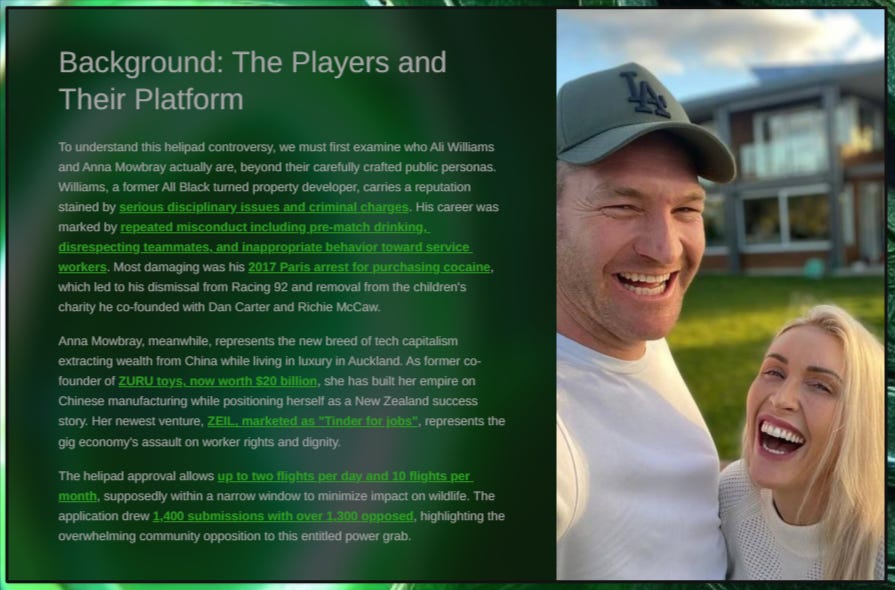"When multimillionaires think their time is worth more than our collective well-being" - 30 June 2025
When Elite Privilege Flies Over People's Heads
Tēnā koutou katoa - a Māori critique of helicopter entitlement in Auckland
Kia ora koutou. Tēnā koutou katoa. Kia haumaru te taiao, kia whakatōhea te tangata - may our environment be protected, and may all people be safe.
When multimillionaires think their time is worth more than our collective well-being
The recent approval of Ali Williams and Anna Mowbray's helipad application at their $24 million Westmere mansion represents more than just noise pollution - it's a perfect example of how wealth insulates the elite from both accountability and community responsibility. This essay exposes the colonial mindset, entitlement culture, and systematic disregard for Māori values embedded in this decision, while revealing the troubling reputations of both applicants who embody everything wrong with neoliberal capitalism in Aotearoa.
Background: The Players and Their Platform
To understand this helipad controversy, we must first examine who Ali Williams and Anna Mowbray actually are, beyond their carefully crafted public personas. Williams, a former All Black turned property developer, carries a reputation stained by serious disciplinary issues and criminal charges. His career was marked by repeated misconduct including pre-match drinking, disrespecting teammates, and inappropriate behavior toward service workers. Most damaging was his 2017 Paris arrest for purchasing cocaine, which led to his dismissal from Racing 92 and removal from the children's charity he co-founded with Dan Carter and Richie McCaw.
Anna Mowbray, meanwhile, represents the new breed of tech capitalism extracting wealth from China while living in luxury in Auckland. As former co-founder of ZURU toys, now worth $20 billion, she has built her empire on Chinese manufacturing while positioning herself as a New Zealand success story. Her newest venture, ZEIL, marketed as "Tinder for jobs", represents the gig economy's assault on worker rights and dignity.
The helipad approval allows up to two flights per day and 10 flights per month, supposedly within a narrow window to minimize impact on wildlife. The application drew 1,400 submissions with over 1,300 opposed, highlighting the overwhelming community opposition to this entitled power grab.
The Issue: Colonialism Dressed as Convenience
This helipad controversy reveals multiple layers of colonial thinking and neoliberal entitlement. The applicants claim they need private helicopter access to avoid a 15-minute drive to Albany public heliport, perfectly encapsulating how the wealthy view public infrastructure as beneath them. This attitude directly violates Māori values of whakatōhea (collective well-being) and manaakitanga (caring for community).
The decision-making process itself excluded meaningful consultation with mana whenua, despite the location's significance to Māori. The commissioners dismissed concerns about disturbing endangered bird populations that migrate through Cox's Bay, showing complete disregard for kaitiakitanga principles that require protection of natural resources for future generations.
The entire application process demonstrates how supposedly "neutral" bureaucratic systems favor the wealthy while marginalizing community voices. Despite overwhelming opposition, three independent commissioners approved the application, proving that "independence" often means independence from community accountability, not from elite influence.
Analysis: Neoliberal Entitlement Meets Colonial Power
Individual Rights Trumping Collective Well-being
The commissioners' decision reflects classic neoliberal thinking that prioritizes individual property rights over collective community interests. Their reasoning that Williams and Mowbray's property provides "greater buffer distance" justifying helicopter operations reveals how wealth literally buys space that insulates the rich from the consequences of their actions. This violates whakatōhea, the Māori value emphasizing collective responsibility and care for community well-being.
The couple's absence from their own hearing - choosing to "observe online" rather than face their community - demonstrates the entitled detachment typical of the ultra-wealthy. They demand community resources and tolerance while refusing to engage in person with those affected by their decisions. This behavior exemplifies what Māori understand as the opposite of manaakitanga - taking without giving, demanding without reciprocating.
Environmental Racism and Kaitiakitanga Violations
The approval process systematically ignored Māori environmental values. Auckland Council admitted it wouldn't seek mana whenua feedback because no sites of Māori significance were officially registered in planning documents - a circular logic that excludes Māori perspectives by design. This institutional blindness to Māori environmental knowledge represents environmental racism disguised as bureaucratic neutrality.
The decision dismisses concerns about impact on migrating shorebirds that use Cox's Bay as feeding grounds. From a Māori worldview, these birds are taonga requiring protection under kaitiakitanga principles. The commissioners' willingness to risk ecological damage for private convenience shows how colonial law prioritizes profit over environmental protection.
Wealth Insulation and Democratic Deficit
The couple's lawyer dismissed community opposition as "alarmist and unhelpful" driven by "personal prejudices" against his clients' "public profile." This argument reveals how wealth provides narrative control - opposition to elite privilege gets reframed as unreasonable bias rather than legitimate democratic engagement. The claim that over 1,300 submitters don't know what they're talking about demonstrates breathtaking arrogance typical of neoliberal dismissal of community knowledge.
The commissioners accepted expert reports funded by the applicants while questioning community lived experience. This privileging of paid expertise over local knowledge reflects colonial epistemology that devalues indigenous and community ways of knowing. From a Māori perspective, the community members using Cox's Bay for generations possess environmental knowledge that should take precedence over consultant reports.
Pattern of Problematic Behavior
Williams' reputation adds another troubling dimension to this case. His cocaine purchase conviction in Paris and pattern of disciplinary issues throughout his rugby career demonstrate a history of believing rules don't apply to him. The fact that someone with such a track record can successfully demand community accommodation shows how wealth insulates people from consequences.
Mowbray's business model of extracting profit from Chinese manufacturing while claiming New Zealand identity represents contemporary colonialism - extracting wealth from exploited labor abroad while demanding elite privileges at home. Her recent investments in aluminum can manufacturing and recruitment platforms demonstrate the relentless expansion of capital into every aspect of life.
Broader Implications: Elite Capture of Public Space
This helipad approval represents elite capture of public decision-making processes. The fact that Auckland now has multiple residential helipads shows how individual approvals create systemic privilege for the wealthy. Each approval makes the next easier to justify, gradually normalizing elite appropriation of public airspace and acoustic commons.
The decision creates dangerous precedent for other Auckland waterfront locations, as residents noted: "Point Chevalier next once they've done the Westmere water line, then it'll be Te Atatū after that and then it'll be Birkenhead." This expansion threatens to turn Auckland's coastal areas into private aviation corridors for the ultra-wealthy.
For Māori communities, this decision reinforces historical patterns of exclusion from environmental decision-making. Despite Treaty obligations requiring partnership and protection of Māori interests, the process systematically excluded mana whenua voices and dismissed environmental concerns rooted in Māori worldviews. This continues the colonial tradition of treating Māori knowledge as irrelevant to land use decisions.
The approval also demonstrates how growing wealth inequality translates into differential access to public resources. While ordinary Aucklanders struggle with housing costs and inadequate public transport, billionaires demand private aviation infrastructure at community expense. This violates fundamental Māori values of equity and collective responsibility.
Reclaiming Community Power
The Williams-Mowbray helipad approval exposes how neoliberal capitalism and colonial power structures work together to serve elite interests at community expense. Despite overwhelming opposition, money and legal representation triumphed over democratic engagement and environmental protection. This decision violates core Māori values of whakatōhea, manaakitanga, and kaitiakitanga while perpetuating the colonial logic that treats land and airspace as commodities for elite consumption.
Community resistance to this helipad demonstrates the power of collective action grounded in values of environmental protection and democratic participation. The Quiet Sky Waitematā group's successful mobilization of over 1,300 submissions shows how ordinary people can challenge elite privilege when they organize effectively around shared values.
Moving forward, communities must demand decision-making processes that center indigenous knowledge, environmental protection, and collective well-being over individual wealth accumulation. This means challenging the systemic biases that privilege paid experts over community knowledge and individual property rights over collective environmental responsibility.
The fight against elite helicopter privilege connects to broader struggles against wealth inequality, environmental destruction, and colonial power structures. By grounding resistance in Māori values and demanding genuine democracy, communities can build the foundation for a more just and sustainable future.
I humbly ask readers who find value in this analysis to consider a koha to support this mahi: HTDM: 03-1546-0415173-000. The Māori Green Lantern understands these tough economic times for whānau, so please only contribute if you have capacity and wish to do so.
Kia kaha, kia maia, kia manawanui.
Ivor Jones
The Māori Green Lantern








